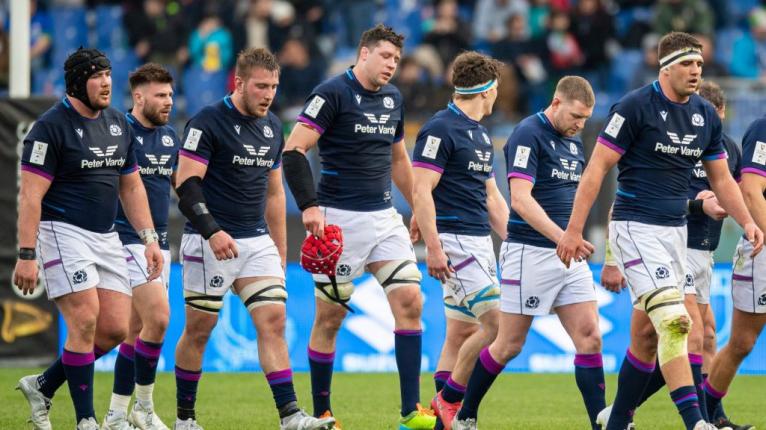For Dublin, read Punxsutawney. For the Six Nations Championship, read Groundhog Day. Scotland are mired in a rugby vortex, their squad of unprecedented talent doomed – or determined – to repeat the same mistakes, fall at the same hurdles.
Save the opening day and the Calcutta Cup maelstrom, this was a largely miserable tournament for Gregor Townsend. His team imploded in Cardiff. They were dismembered by France, disjointed in Rome, and easily put away by an Ireland side that never got out of second gear but never had to. And looming over it all, the unseemly spectre of six players – including captain Stuart Hogg and two other Lions – breaching team protocol to go to the pub.
The drama and joy of that see-sawing contest with England was only six weeks ago, but it feels like six months. The positivity has long since been leeched away. Scotland were dogged and ruthless that afternoon without reaching the levels they’d proven themselves capable of in 2021. After all they’d achieved last year, they were being cautiously talked about as title contenders. That is a laughable notion now.
It is as if this team has discarded all of the things that propelled them to seismic wins in 2020 and 2021. Scotland built those solid, three-win championships on the foundation of brutal defence, breakdown snarl and stringent discipline. They played smart rugby to beat France and England twice, to win a pig of a game in Wales for the first time in forever. They weaved some lovely attacking phase play, but tempered it with new-found belligerence and pragmatism. Scour the carcass of the recently deceased campaign, and your eyes pop at the extent of the deterioration.
Upon Steve Tandy’s arrival two years ago, Scotland reinvented themselves as a team that loved defending. They looked meaner and more organised. They conceded the fewest tries and points that season, the joint-fewest tries and second-fewest points the next. That stubbornness has deserted them. Scotland shipped as many tries – 15 – this year as they did in the previous two combined.

They had four put on them in Ireland, three in Rome and lost six at home to France. Nobody had scored six at Murrayfield in a championship match since Wales in 2005. Scotland’s willingness to trundle straight into the teeth of Shaun Edwards’ blitz that day was astonishingly ill-conceived.
They conceded 61 penalties in all, trumping their previous two tallies of 55 and 45. An average of 12 per game, and an ugly 15 conceded at the Aviva. What struck you most about the slew of infringements was how thunderously dull so many of them were. When Hogg blew that glorious, cringe-so-hard-at-it-you’ll-pull-six-facial-muscles opportunity in Dublin, Ireland still had to throw in to a line-out five metres from their own line. A minute later, they had won back-to-back penalties, gobbled up a swathe of easy territory and still had possession. They did not have to work hard for their metres.
Momentum-changing tries were blown against the two strongest teams in the tournament. Balls were spilled, maddening decisions taken, opportunities spurned.
A bucketload of those 61 penalties came at the breakdown, where Scotland were blasted away too often by the intensity and dynamism of the heavyweight teams. Nearly 70% of Ireland’s rucks on Saturday were completed in under three seconds. Scotland managed only 42%.
To this, you can add an error mountain of Himalayan proportions. Momentum-changing tries were blown against the two strongest teams in the tournament. Balls were spilled, maddening decisions taken, opportunities spurned. The Dublin purgatory was laced with Scottish elan in the opening ten minutes, but little thereafter. Perhaps the shrivelling of Scotland as an attacking force is the most concerning element of all.
“Today, I thought that was some of the best rugby we’ve played in the championship,” said Townsend on Saturday evening.
Some of Scotland’s best rugby, yet still a perfunctory bonus-point win for Ireland, who left plenty tries out there. If that was some of Scotland’s best, what does it say about the stuff served up in the rest of the tournament? Pick a team of the Six Nations, and no Scot gets in it. Virtually none would even be in the conversation.

Townsend spoke, too, about the unsanctioned bar visit that set an ugly narrative in the final week of the tournament. Six of his most senior players – his captain, Hogg, his half-backs, Ali Price and Finn Russell, first-choice wing and centre, Darcy Graham and Sam Johnson, and newcomer Sione Tuipulotu were disciplined for going out after Scotland returned from beating Italy. He said that despite the incident, his players had their best training week of the championship. A spiky Hogg gave little away, besides reiterating the apology he’d made to his team-mates. The questions came thick and fast, like body-blows to men whose ribs were already cracked.
A sense of perspective is needed here. Going for a beer after an international match is hardly a heinous crime. Nobody should underestimate the stresses of elite rugby, especially while shut away in a covid bubble, under the glare and pressure applied by a huge championship.
Perhaps Townsend, who has in the past been painted as a micro-manager, runs too tight a ship. Maybe the players have simply treated their team code of conduct, or their coach, with disdain.
But if you’re in such a position, particularly if you’re the captain of a side who has pre-agreed behaviour about what’s acceptable and what isn’t, heading for pints is a spectacularly foolish thing to do.
On the most simplistic level, it risks bringing the virus into camp, and decimating the squad, at a time when cases in Scotland have soared. More importantly, what does it say about the culture Scotland have created, a culture we have heard plenty about these past few years? It suggests these very senior players think themselves above the rules, think the rules don’t matter, or believed they wouldn’t get caught breaking them. It is hard to know which is worse. It is equally hard to imagine Alun Wyn Jones, Johnny Sexton or Richie McCaw becoming embroiled so.
Whatever the case, the episode reflects incredibly poorly on the Scottish environment. Perhaps Townsend, who has in the past been painted as a micro-manager, runs too tight a ship. Maybe the players have simply treated their team code of conduct, or their coach, with disdain. It could be both. Neither bodes well. Scotland supporters are entitled to feel extremely let down.

Townsend will be deeply frustrated by another off-field stramash. He may feel his authority and the sanctity of team rules have been eroded – and by his captain, no less. It is only two years since the saga of Russell, the third beer, and the calamitous rift between coach and stand-off.
The upshot? Another round of uncomfortable questions. Townsend has come back from adversity before, when calls for his head grew after the pathetic 2019 World Cup. He brought in shrewd assistants and ceded more control to them. He abandoned his blueprint to play the fastest rugby in the world. He mended fences with Russell. He reinvigorated and refreshed a group haunted by the horrors of Japan.
Part of the anguish is that more is expected of Scotland these days. They have smashed hoodoos in Wales, England and France, routinely beaten the Wallabies, held the Calcutta Cup in four of the past five years and run South Africa and New Zealand close
Still, problems dog him – mistakes, discipline, and a chronic failure to back up big results. Consistently winning has never been easy for Scotland to achieve, but on Townsend’s watch, following this team is like spending the day at Alton Towers. The Calcutta Cup feelgood was obliterated in seven days by the pallor of Scotland’s performance in Cardiff. That trend shows no sign of abating.
Part of the anguish is that more is expected of Scotland these days. This is comfortably the best pool of players the country has known in the professional era. They have smashed hoodoos in Wales, England and France, routinely beaten the Wallabies, held the Calcutta Cup in four of the past five years and run South Africa and New Zealand close. They are spoken about differently to those who have gone before, because they have earned that right. They have splintered barriers to what was thought possible for a Scotland team.
The great worry is that they have struck a ceiling, that while they can produce whopping victories in isolation, they just don’t quite have it within themselves to grind out win after win, week after week. Townsend was asked whether his players have the mentality to challenge for a championship, or at least be in the running come the final weekend. “It’s a good question,” the coach acknowledged, before talking about the pedigree of his opposition, and what lies ahead in the summer and autumn.

This talented clutch, with so many protagonists in their prime years, could come and go without claiming their championship. You cannot question their role in reshaping the Scottish narrative, but it would be a gut-wrenching failure if they could not muster one credible title shot.
Scotland’s ambition should no longer be sated by three wins a season, never mind the meagre two they must make do with now. We hear talk about growth, development, foundations. What we have seen this championship instead is an alarming regression, and another sign of a fractured team culture.
In the end, Scotland are left with more questions than answers, more frustration, and more unfulfilled promise. More days in Punxsutawney.



I absolutely agree that we have the best group of players when all playing well, but we must also not forget that Ireland and France can also say the same. I also think that the captaincy weighs heavy on Hoggy's shoulders and he should be replaced, not so much for disciplinary reasons but to let him play with freedom and less responsibility. The other 3 areas we have problems with are not having an outside half that can manage a game. Good though the forwards have been we were outmuscled by Ireland and France and we shall never consistently win games, giving the opposition a shed load of penalties and I think we need divine intervention to get through our world cup pool that includes Ireland and South Africa.
There's a clamour for EJ to leave coaching England. I firmly believe GT should also be replaced. Tactics in the games don't show confidence rather we kick the ball away so teams can just run at us.
Kinghorn's a good back 3 player and should be on the bench to cover Full Back and wing. It was not fair to expose him at stand off when we do have others like Hastings if Finn was to be dropped.
I just think this is extremely poor management, you could see Kinghorns head go down. Not his fault...
Tell us how you really feel !
Cannot disagree with the points made - I was so hopeful at the outset , and so disappointed by what I saw as the tournament progressed.
So much talent - it would be such a shame to not see them really achieve meaningful, sustained success before it's too late for them.